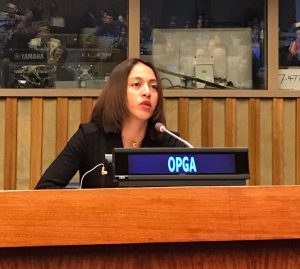Statement from the H.E. Peter Thomson, President of the General Assembly, delivered by Sofia Borges on the observance of the international mother language day – “Towards Sustainable Futures through Multilingual Education”
21 February 2017
I have the honour to deliver these remarks on behalf of the President of the General Assembly who unfortunately cannot be here this evening, as he is travelling overseas.
Excellencies, ladies and gentlemen
Thank you to the Permanent Missions of Bangladesh, Hungary, Mauritius, Peru and Vanuatu, as well as UNESCO and the City of New York, for organizing this event to commemorate ‘International Mother Language Day’.
I am honoured to address the first New York commemoration of ‘International Mother Language Day’, and I regret that I am unable to join you in person for the occasion.
Excellencies, ladies and gentlemen
As we look around our world, it is clear to see that it is the diversity of humanity that fills our lives with colour, culture, vibrancy, and vitality.
And that diversity in language plays an enormous part in the creation of this rich tapestry.
Across our world, nearly 7,000 distinct languages are spoken.
And with language representing the primary method of communication between people, each of these languages embodies a different legacy of the human experience.
Each of these 7,000 mother languages have passed down through the generations stories, fables, values and beliefs.
And each has been used to express love, to build families and communities, to educate the young, and to preserve history.
Despite this rich heritage, across our world almost 3,000 languages are currently considered at risk of extinction.
With 94 percent of the world’s population speaking only 6 percent of its languages, an enormous burden has been placed on the 6 percent of others who speak 94 percent of global languages.
And for those them who only speak one language, they are particularly exposed to social, economic, cultural and political marginalisation.
The solution for many of these populations has, regrettably, been to adopt more widely-used languages, leading to the irreparable loss of mother language, particularly amongst minority populations and in low-income countries.
Indeed, as we meet, Small Island Developing Countries and Least Development Countries are the most vulnerable to language extinction, with countries like Papua New Guinea – the most linguistically diverse country in the world, with over 800 distinct languages spoken – seeing indigenous languages dying out at pace.
In our rapidly-changing world it is critical that we do not allow the increased interconnectivity of people to lead to cultural gentrification and irreparable loss of mother language.
Specific steps must therefore be taken to slow the extinction of mother languages, preserve them for future generations, and rebuild their usage among the world’s population.
Firstly, we must promote multilingualism across our world. This includes raising awareness at all levels of the negative impacts of language loss, particularly on the preservation of cultural heritage and history, as well as the value of multilingualism, including cross-cultural understanding, educational and economic opportunities, and peace.
Secondly, we must create enabling environments for mother language preservation. This includes by fostering early childhood education that focuses on mother language as the primary medium for learning while also promoting multilingual education.
Thirdly, we must support efforts to reduce linguistic discrimination, including in official communications, and in online content.
Fourthly, we must invest in language preservation initiatives to ensure that our endangered languages are not lost forever.
And finally, we must ensure that our efforts to implement the 2030 Agenda for Sustainable Development not only reach linguistically-diverse communities so that they are not left behind, but that we see the preservation and protection of mother languages, and the promotion of multilingualism, as key drivers of sustainable development.
This includes by advancing cross-cultural understanding, promoting respect for all persons, building peaceful and inclusive societies, protecting human rights, furthering equality, and advancing educational, employment and economic opportunities for all.
Indeed, here at the United Nations’ we do not need to look far to see the outstanding work of the interpreters and translators demonstrating the value of multilingualism, by bridging people, uniting nations, and promoting equality and mutual understanding. And I would like to take this moment to thank them for their service.
Excellencies, ladies and gentlemen
In closing, on this ‘International Mother Language Day’ I commend you all for your dedicated efforts to promote the importance of linguistic diversity across our world, and to protecting our rich cultural heritage for generations to come.
I thank you.


